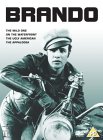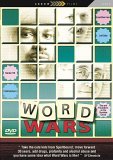 Marlon Brando Box Set | DVD | (22/11/2004)
from £39.90
| Saving you £-3.91 (N/A%)
| RRP
Marlon Brando Box Set | DVD | (22/11/2004)
from £39.90
| Saving you £-3.91 (N/A%)
| RRP A collection of classic and unusual Marlon Brando movies including The Wild One One The Waterfront The Ugly American and The Appaloosa. The Wild One (1954) An angry young Marlon Brando scorches the screen as The Wild One in this powerful 50s cult classic. Brando plays Johnny the leader of a vicious biker gang that involves a small sleepy California town. The leather-jacketed young biker seems hell-bent on destruction until he falls for Kathie (Mary Murphy) a 'good-girl' w
![Laissez Passer [2002]](/pictures/1002711.jpg) Laissez Passer | DVD | (24/03/2003)
from £26.98
| Saving you £-6.99 (N/A%)
| RRP
Laissez Passer | DVD | (24/03/2003)
from £26.98
| Saving you £-6.99 (N/A%)
| RRP Bertrand Tavernier directs this epic film set in 1942 Paris during the country's occupation by Germany. The French film industry during that period is the focus of the story told from the point of view of two characters: an actor and a director.
![Marlon Brando - The Wild One/On The Waterfront/The Ugly American/The Appaloosa [DVD]](/pictures/1104458.jpg) Marlon Brando - The Wild One/On The Waterfront/The Ugly American/The Appaloosa | DVD | (20/09/2010)
from £14.83
| Saving you £15.16 (102.22%)
| RRP
Marlon Brando - The Wild One/On The Waterfront/The Ugly American/The Appaloosa | DVD | (20/09/2010)
from £14.83
| Saving you £15.16 (102.22%)
| RRP Titles Comprise: The Wild One: Brando plays Johnny the leader of a vicious biker gang that involves a small sleepy California town. The leather-jacketed young biker seems hell-bent on destruction until he falls for Kathie (Mary Murphy) a good-girl whose father happens to be a cop. Unfortunately for Johnny his one shot at redemption is threatened by a psychotic rival Chino (Lee Marivn) plus the hostility and prejudice of the townspeople. All their smouldering passions explode in an electrifying climax. On The Waterfront: Marlon Brando is the longshoreman who finds himself increasingly isolated when he challenges the might and power of the tough New York City dockers' Union. Rod Steiger is his elder brother torn between loyalty to union and love of family. Lee J. Cobb is the powerful union boss while Eva Marie Saint is the girl with whom Brando falls in love. The Ugly American: Harrison MacWhite has just been named ambassador to the (fictional) Southeast Asian country of Sarkhan but may regret taking the job. When he arrives there MacWhite discovers a country in turmoil and he can't help becoming involved in the nation's incendiary politics. Furthermore MacWhite's naivete -- and cockiness -- only make things worse... The Appaloosa: Marlon Brando star as Matt Fletcher a Mexican-American buffalo hunter who sets out to get revenge on the local bandit (played by John Saxon) that steals his beloved horse.
 Tongues Untied (DVD + Blu-ray) | Blu Ray | (19/10/2020)
from £18.29
| Saving you £N/A (N/A%)
| RRP
Tongues Untied (DVD + Blu-ray) | Blu Ray | (19/10/2020)
from £18.29
| Saving you £N/A (N/A%)
| RRP After its 1989 release and subsequent screening on public television, Tongues Untied polarised critics with its unapologetic portrayal of black gay experience in America. Part documentary, part performance, it was described as the film we have been waiting for by critic Cary Alan Johnson and vilified as a misuse of public funds by right-wing presidential hopeful Pat Buchanan. Such divided opinions were testament to the films lasting impact as a powerful depiction of the ongoing black liberation movement, twinned with devastation of the AIDS crisis. 30 years on, the poetry of Marlon Riggs himself, as well as performances from Essex Hemphill and Brian Freeman, comprise a unique record of a critical historical moment with fierce intelligence, virtuosic rhythm and courageous hope that still stuns today. Special Features: Presentation in High Definition and Standard definition Anthem (1991, 9 mins): an experimental music video portraying a vibrant, exciting and defiant community of black gay men Affirmations (1990, 10 mins): featuring the poetry of Essex Hemphill, this is a beautiful short film exploring the dreams, desires and fantasies of black gay men Non, Je ne regrette rien (1992, 38 mins): a timely and illuminating documentary examining the impact of HIV and AIDS. There's fierce and fascinating insight at every turn, and a classic example of Rigg's formally distinctive style **FIRST PRESSING ONLY** Fully illustrated booklet with new writing on Tongues Untied and the accompanying short films and full film credits Other extras TBC
![Burn! [1969]](/pictures/1072865.jpg) Burn! | DVD | (16/07/2007)
from £27.99
| Saving you £-18.00 (-180.20%)
| RRP
Burn! | DVD | (16/07/2007)
from £27.99
| Saving you £-18.00 (-180.20%)
| RRP The Man Who Sells War. A Caribbean island in the mid-1800's. Nature has made it a paradise; man has made it a hell. Slaves on vast Portuguese sugar plantations are ready to turn their misery into rebellion - and the British are ready to provide the spark. They send agent William Walker (Marlon Brando) on a devious three-part mission: trick the slaves into revolt grab the sugar trade for England...then return the slaves to servitude. Colonialism and insurrection are explored in the searing epic Burn!. Both visually and narratively stunning Burn! glows with the fires of filmmaking genius. Genius is also evident in Brando's complex intelligent portrayal of a man who is both gentleman and scoundrel revolutionary and colonialist. And Ennio Morricone's haunting music memorably underscores the almost overwhelmingly powerful story.
 Word Wars | DVD | (05/02/2007)
from £N/A
| Saving you £N/A (N/A%)
| RRP
Word Wars | DVD | (05/02/2007)
from £N/A
| Saving you £N/A (N/A%)
| RRP Tiles and tribulations... There is a dedicated community of people for whom Scrabble is more than a domestic nicety - it is an obsession. They devote years of their lives to mental and physical preparation and travel the country - some full-time - competing in cutthroat tournaments. The dictionary is studied with religious devotion each obscure word another weapon for the ultimate battle. For some the game keeps them teetering on the safe side of sanity. For others it has pushed them just over. Some scrape by on the meager winnings alone. In another corner of the Scrabble universe - New York City's Washington Square Park - you'll find a ragtag bunch oblivious to anything besides the games at hand - restaurateurs grizzled veterans the seemingly homeless - all obsessing about words with a Q but no U: QAT QAID QINTAR... This is Not your grandmother's Scrabble. Word Wars delves into both of these worlds focusing on four of the game's highest-ranked players as they advance from heated competition in neighborhood parks and clubs to highly organized regional and national tournaments culminating in the 2002 National Championship in San Diego where the top prize is $25 000 and an appearance on the Today Show. Word Wars is a thoroughly entertaining and hilarious look at the competitive world of Scrabble!
![A Streetcar Named Desire [DVD]](/pictures/1144846.jpg) A Streetcar Named Desire | DVD | (23/03/2020)
from £15.98
| Saving you £N/A (N/A%)
| RRP
A Streetcar Named Desire | DVD | (23/03/2020)
from £15.98
| Saving you £N/A (N/A%)
| RRP Looking for a benchmark in movie acting? Breakthrough performances don't come much more electrifying than Marlon Brando's animalistic turn as Stanley Kowalski in A Streetcar Named Desire. Sweaty, brutish, mumbling, yet with the balanced grace of a prize-fighter, Brando storms through the role--a role he had originated in the Broadway production of Tennessee Williams's celebrated play. Stanley and his wife, Stella (as in Brando's oft-mimicked line, "Hey, Stellaaaaaa!"), are the earthy couple in New Orleans's French Quarter whose lives are upended by the arrival of Stella's sister, Blanche DuBois (Vivien Leigh). Blanche, a disturbed, lyrical, faded Southern belle, is immediately drawn into a battle of wills with Stanley, beautifully captured in the differing styles of the two actors. This extraordinarily fine adaptation won acting Oscars for Leigh, Kim Hunter (as Stella) and Karl Malden (as Blanche's clueless suitor), but not for Brando. Although it had already been considerably cleaned up from the daringly adult stage play, director Elia Kazan was forced to trim a few of the franker scenes he had shot. In 1993, Streetcar was re-released in a "director's cut" that restored these moments, deepening a film that had already secured its place as an essential American work. --Robert Horton
![A Streetcar Named Desire (2 Disc Special Edition) [1951]](/pictures/1047128.jpg) A Streetcar Named Desire (2 Disc Special Edition) | DVD | (07/08/2006)
from £N/A
| Saving you £N/A (N/A%)
| RRP
A Streetcar Named Desire (2 Disc Special Edition) | DVD | (07/08/2006)
from £N/A
| Saving you £N/A (N/A%)
| RRP Tennessee Williams based his screenplay on Oscar Saul's adaptation of Williams' own Pulitzer Prize-winning play set in a grimy New Orleans project. The story of the fragile sentimentalism of a woman who visits her sister only to be taunted mercilessly by her childish brother-in-law. This classic film garnered 12 Academy Award Nominations (including Best Picture Best Director Best Actor (Marlon Brando) and Best Screeplay) winning 4 including Best Actress (Vivien Leigh) Best Supporting Actress (Kim Hunter) and Best Supporting Actor (Karl Malden). This version features three minutes of footage that was deleted from the final 1951 release version upon demands made by the Production Code footage thought lost until its rediscovery in the early 1990s. This DVD release is the fully restored version of Elia Kazan's original cut and the documentary 'Desire And Censorship' on Disc 2 describes his struggle in getting the past the censors.
![A Streetcar Named Desire [Blu-ray]](/pictures/1120246.jpg) A Streetcar Named Desire | Blu Ray | (28/01/2013)
from £19.98
| Saving you £N/A (N/A%)
| RRP
A Streetcar Named Desire | Blu Ray | (28/01/2013)
from £19.98
| Saving you £N/A (N/A%)
| RRP A Streetcar Named Desire is the 1951 Elia Kazan/Tennessee Williams triumph that earned 12 Academy Award nominations, including Best Picture, while also courting controversy with some last-minute edits undertaken to appease the censorship board. Marlon Brando made his first indelible mark on audiences in this powerful adaptation of Tennessee Williams' Pulitzer Prize-winning play. Gone With the Wind's Vivien Leigh is the neurotic belle Blanche du Bois who struggles to hold on to her fading Southern gentility against the brutish badgering of her brother-in-law, Stanley Kowalski (Brando). Leigh, Kim Hunter, Karl Malden and the rich black-and-white cinematography were all awarded Oscars for this cinematic classic. While Brando was the only one of the film's four Oscar-nominated actors not to secure a win, his passionate cries of Stella! Stella! Stella! remain etched forever in Hollywood history. Special Features: Commentary by Karl Malden, Rudy Behlmer and Jeff Young Elia Kazan: A Director's Journey (1995 First Run documentary) A Streetcar on Broadway A Streetcar in Hollywood Censorship and Desire North and the Music of the South An Actor Named Brando Marlon Brando Screen Test Outtakes Audio Outtakes Warner Bros. (1951) 20th Century Fox (1958 Reissue) United Artists (1970 Reissue)

Please wait. Loading...
This site uses cookies.
More details in our privacy policy